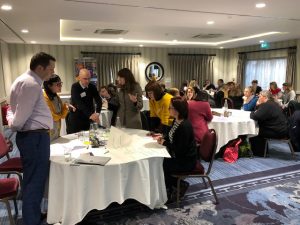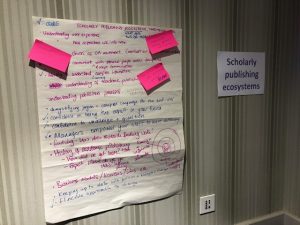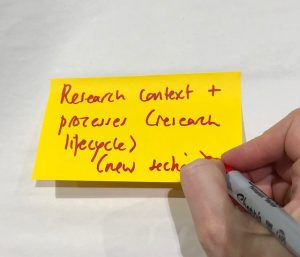Building on recent work in the sector in the area of skills for those working in scholarly communication and open access roles, we ran a workshop in York in February “Developing a skilled workforce: the skills needed to support scholarly communication and open access”.
Intended to be interactive and practical – the workshop provided an opportunity to share issues, concerns and practices, to give feedback on existing activities and to shape future activity.
issues, concerns and practices, to give feedback on existing activities and to shape future activity.
The event was popular but many couldn’t attend in person so we ran a simultaneous tweet chat – questions were posed throughout the day and we’ve captured the answers and discussion in this Wakelet.
Challenges and key issues
Starting with a welcome [PDF Slides] and recap of recent work in the sector ,we swiftly moved on to discussing the challenges faced by institutions in terms of staff development. These discussions continued throughout the day and the key issues emerging were:
- Roles have evolved and are still evolving – are the roles mature enough to enable a framework to be developed? Comments included “I’m not sure how much I’m meant to know” and “Instead of more money, we just get better job titles”.
- Varying roles across institutions and sometimes within institutions and varying team sizes mean that defining a key set of skills for a particular role is difficult.
- Lack of support and progression. The approach is often to appoint and let someone get on with it – many reported that they had felt unsupported. Once in role, there are no progression paths as this is a new area.
- Backgrounds. There was discussion of the role of library qualifications – was having a PhD more important? This prompted a good discussion on Twitter. There was a strong message to welcome mixed teams with staff with different strengths and to value the different strengths brought by librarians/PhD/science/arts backgrounds. It was suggested that perhaps a blank slate better, so that institutions could give them the appropriate knowledge.
- Mixed views on soft skills. While seen as absolutely essential, some felt these could be taught but that gaining specialist scholarly communications knowledge was harder. Others thought the opposite!
- Recruitment issues. -The impenetrable language around job descriptions was seen as off-putting to many candidates. There was a lack of qualified applicants and perhaps unrealistic expectations from employers, with too many skills being asked for in one person.
- Equivalent experience. Most job descriptions say “equivalent experience” but do people understand the role enough to know what’s equivalent?
- A standard approach to job descriptions? While value was seen in job descriptions being collected, attendees felt that it was too difficult to standardise job descriptions due to institutional variations.
- The need for on-the-job training. Some felt that it was hard to provide standardised training for these roles and that most of it needed to be “on the job”.
- The need for a competency framework. There were mixed views on the benefits of a competency framework and indeed whether it is possible (given varying roles, team structures etc).
- What’s needed in terms of support resources? There are a lot of resources out there – so what else is needed? What can be done that’s different or better? Is endorsement by relevant sector organisations the key? Or perhaps some kind of accreditation?
- Peer support and sharing. The importance of peer support was strongly emphasised and some suggested that the focus of sector activities should be on sharing not training.
Experiences from institutions
We then heard from three institutions giving their experiences of recruitment and developing staff.
Helen Dobson Scholarly communications manager, University of Manchester. Developing a skilled workforce: an institutional perspective [PowerPoint Slides]
Helen explained how everyone recruited recently (bar one) has been taught on the job. She described recruitment as a game of ‘snakes and ladders’ – it takes around 28 weeks for staff to get up to speed, they are trained and then they leave, which is hard to manage. Their in-house training is done by librarians, covering general background and institution specific processes and they have developed a detailed toolkit for the latter. There is a culture of self-reflection in terms of development and a focus on effective communication (be bold, be confident, choose the right way to communicate). Their ‘Trading Places’ programme allows exchanging of experience between roles.
Valerie McCutcheon Research information manager, University of Glasgow. Skills for Research Information Management Team and Friends. [PowerPoint Slides]
Valerie gave an overview of the teams supporting OA at Glasgow – a core OA team triaging support, the repository team and acquisitions. Wider support is embedded throughout the institution. All support is aimed at saving researchers’ time. She presented an overview of the backgrounds from the teams, which included a good spread of skills and subject backgrounds. She posed the question whether general personal skills such as customer focus, attention to detail, were more important than background – we need to welcome different roles and backgrounds. Does an individual need a wide range of skills or just know how to access them? She ended with a plea for more sharing of practice and a suggestion that any competency framework should start small with an agreed baseline.
Michelle Blake, Head of relationship management (information services), University of York. Soft skills to enable effective relationships. [PDF Slides]
Michelle’s presentation focussed on soft skills to enable effective relationships – a key skill outlined by many when discussing scholarly communication roles. She described the work York have done to support staff in developing their skills in this area, highlighting that the SCONUL mapping the future for academic libraries report identified soft skills as critical. They have also spent time getting a better understanding of how academics work in order to inform their services and approaches. More detail on their work can be found on the libinnovation blog.
Skills and competencies
In the afternoon we worked on exploring the skills and knowledge required for scholarly communications roles, using a hybrid version of the NASIG and COAR frameworks as a starting point. Before the groupwork, we heard another presentation to provide background.
Nancy Pontika, The Open University. Skills and knowledge for scholarly communications roles: what do job descriptions tell us? [PowerPoint Slides]
Nancy presented some of the results of her analysis of job descriptions which she collected over a two year period. Essentially, she said, people in these roles “need to be everywhere, talking to everyone and to know everything!”. She also noted that adverts for data roles often asked for an additional area of expertise, so candidates needed to be expert in two areas. Job descriptions were split on whether they required a library and information science degree. She raised a question about whether candidates were increasingly required to be active researchers, which prompted discussion in the room and on twitter. One of her key findings was that the vast majority of jobs stated ‘equivalent experience’, suggesting that work may need to be done to support potential candidates in recognising and expressing other experience that may be relevant.
The full outputs from the groupwork are captured here [PDF], but some key points emerged from the activity and discussion:
- Confusing language. This was referring to the language used in the framework itself, which meant it was often difficult to understand. Too much jargon and too many acronyms across the whole area of scholarly communication.
- Importance of personal attributes. While we aimed to identify skills and knowledge, the focus was often on personal attributes such as confidence, enthusiasm, patience and tenacity.
- Levels of knowledge. We asked attendees to try to identify different levels of knowledge required. This often depended on team structure – larger teams can have more specialist knowledge, whereas smaller teams are expected to know more.

- What’s missing? We also asked attendees to identify what was missing from the current framework. User experience in terms of understanding needs and designing interfaces was the key area identified. Other areas included teaching skills, developing collaborative partnerships and understanding of the wider research context.
Next steps
In March, the Scholarly Communications Competencies Coalition (SC3) met again to discuss latest activities, including findings from the York event. Activities over the coming months include:
- Events. Various members of the SC3 are running sessions at UKSG , LILAC and ARLG conferences. There will also be updates at the ARMA conference and the UKCoRR members day.
- Mapping resources to NASIG framework. The group will map existing resources to the framework identify what’s missing.
- Job descriptions. We have a collection of job descriptions which we aim to use to create banks of statements for reuse.
- The Office of Scholarly Communication at Cambridge University is currently working on a project to open up their popular Research Support Ambassador course to a wider audience. It is anticipated that this will be made available in summer 2019 as an open educational resource
- Research into the background of scholarly communication leads. Alice Read, a Masters student at Sheffield information school, will interview several professionals for her dissertation on roles, pathways and training for these roles.
- New SC3 web page. A page will shortly be created on the UKCoRR web site to gather together the SC3 activities.
